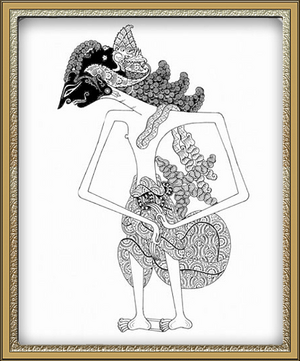Palasara - (Wayang Kulit): Difference between revisions
No edit summary |
No edit summary |
||
| (One intermediate revision by the same user not shown) | |||
| Line 1: | Line 1: | ||
[[File:Palasara.jpg|thumb|''Palasara - son of Bambang Sakri'']] | |||
[[File:Palasara.png|thumb]] | |||
{{Puppets | {{Puppets | ||
|Title=Palasara - (Raden) - Mahabharata | |Title=Palasara - (Raden) - Mahabharata | ||
Latest revision as of 15:04, 24 November 2024
| Title | Palasara - (Raden) - Mahabharata |
|---|---|
| Other names | Parasara, Dwipakeswara |
| Size | 50 cm |
| Personal data | Raden Palasara, son of Bambang Sakri, alias Shaktya and Dewi Sati. Palasara is the grandson of Maharesi Wasista. He met Dewi Durgandini (Satyawati), a daughter of the king of the Wirata country who was meditating on a boat and who later became his wife. They had a son named Byasa or Abiyasa. |
| Appearance | Raden Palasara has knitted eyes, a sharp nose, and a calm face. His hair is decorated with a backward garuda. Some of his hair is loose and in the form of dreadlocks (in clumps) Bersunting waderan. Shawl. Dressed in knightly buttocks. |
| Collection | Private collection |
Palasara – (Raden) – Mahabharata
In the Adiparwa or Mahabharata book, the first part, it is told that Bagawan Parasara stood on the banks of the Yamuna river, asking to be taken across by boat, Satyawati alias Durgandini or Gandawati approached him and then agreed to take him to the other side by boat. On the way, they chatted with each other, Satyawati told that she had a disease that caused her body to smell bad. Her father then said that any man who could cure her disease could be made her husband.
Parasara, who was indeed captivated by Satyawati's beauty, agreed to cure Satyawati's disease. With his abilities as a Rishi, he easily eliminated Satyawati's disease. Palasara's proposal was accepted, finally Palasara and Satyawati got married. They enjoyed their first night on a boat floating in the middle of the Yamuna River. Parasara created a thick, dark fog so that others could not see them. From their relationship, an extraordinary son was born, named Krishna Dwaipayana. From Byasa were born Pandu, Dretarastra and Widura, as the successors to the Kuru kingdom.
Since childhood, Palasara was left by his father to wander who knows where. Palasara lived with his mother in his grandfather's palace, namely in the Wirata palace. One day, he heard that his father was killed by a king named Prabu Kalmasapada, because the king was cursed to become a giant by Bambang Sakri after losing a duel.
Palasara was sad to hear of his father's death and was determined to kill Prabu Kalmasapada. Parasara then studied with a brahmana, he was given a heirloom keris named Pulanggeni as a sign of the end of his study with the brahmana.
Palasara finally met Prabu Kalmasapada with Bagawan Dwapara. Finally there was a duel between them, Prabu Kalmasapada and Begawan Dwara died at the hands of Palasara after being drawn by the Pulanggeni keris. After successfully completing his revenge, Palasara continued his journey to meditate.
Raden Palasara was a knight priest and used the title Begawan. He acted like a priest, but also acted like a knight who liked to fight. It is said that while meditating, Palasara was tempted by a God who disguised himself as a sparrow and nested in the hair of the ascetic. Because he was angry, Palasara hunted the bird, and finally he met Dewi Durgandini, the daughter of the king of the Wirata country who was meditating on a boat at that time. Later Palasara married Dewi Durgandini. The sparrow was actually the creation of a God who had come specifically to seduce Raden Palasara. The Gods wanted the knight to leave his priesthood, according to his calling to live in the country and then reign there as king.
Raden Palasara created the forest into a country, namely the country of Astina. He reigned in Astina as King with the name Prabu Dwipakeswara. According to history, it was Palasara who composed the history and stories about all the Gods and their descendants.
Source: History of Wayang Purwa - Hardjowirogo - PN Balai Pustaka – 1982
Blog: Hadisukirno – Yogyakarta - 2011


